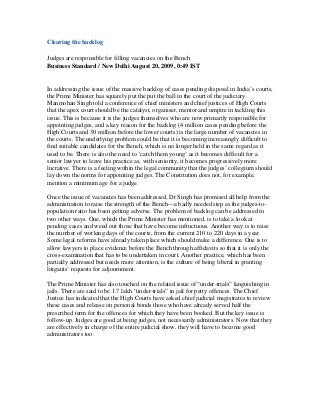
Business standard clearing the backlog
- 1. Clearing the backlog Judges are responsible for filling vacancies on the Bench Business Standard / New Delhi August 20, 2009, 0:49 IST In addressing the issue of the massive backlog of cases pending disposal in India’s courts, the Prime Minister has squarely put the put the ball in the court of the judiciary. Manmohan Singh told a conference of chief ministers and chief justices of High Courts that the apex court should be the catalyst, organiser, mentor and umpire in tackling this issue. This is because it is the judges themselves who are now primarily responsible for appointing judges, and a key reason for the backlog (4 million cases pending before the High Courts and 30 million before the lower courts) is the large number of vacancies in the courts. The underlying problem could be that it is becoming increasingly difficult to find suitable candidates for the Bench, which is no longer held in the same regard as it used to be. There is also the need to ‘catch them young’ as it becomes difficult for a senior lawyer to leave his practice as, with seniority, it becomes progressively more lucrative. There is a feeling within the legal community that the judges’ collegium should lay down the norms for appointing judges. The Constitution does not, for example, mention a minimum age for a judge. Once the issue of vacancies has been addressed, Dr Singh has promised all help from the administration to raise the strength of the Bench—a badly needed step as the judges-to- population ratio has been getting adverse. The problem of backlog can be addressed in two other ways. One, which the Prime Minister has mentioned, is to take a look at pending cases and weed out those that have become infructuous. Another way is to raise the number of working days of the courts, from the current 210 to 220 days in a year. Some legal reforms have already taken place which should make a difference. One is to allow lawyers to place evidence before the Bench through affidavits so that it is only the cross-examination that has to be undertaken in court. Another practice, which has been partially addressed but needs more attention, is the culture of being liberal in granting litigants’ requests for adjournment. The Prime Minister has also touched on the related issue of “under-trials” languishing in jails. There are said to be 1.7 lakh “under-trials” in jail for petty offences. The Chief Justice has indicated that the High Courts have asked chief judicial magistrates to review these cases and release on personal bonds those who have already served half the prescribed term for the offences for which they have been booked. But the key issue is follow-up. Judges are good at being judges, not necessarily administrators. Now that they are effectively in charge of the entire judicial show, they will have to become good administrators too.